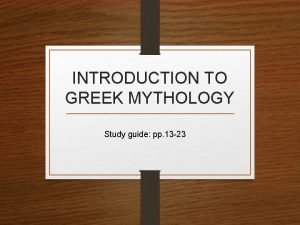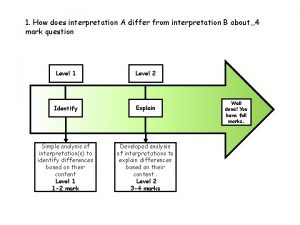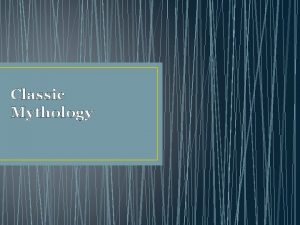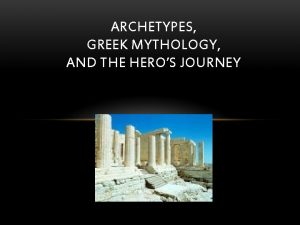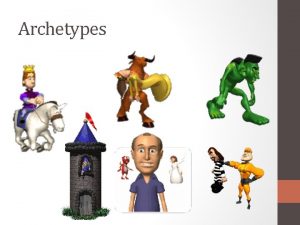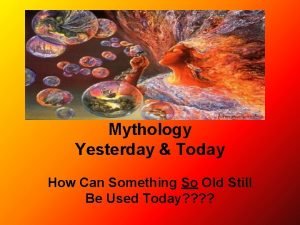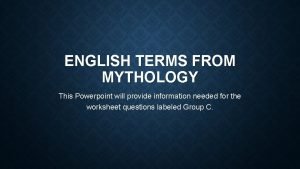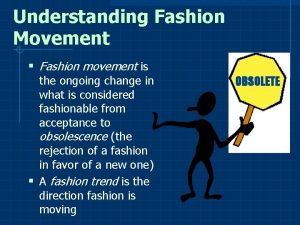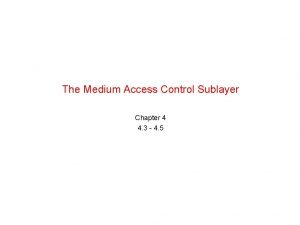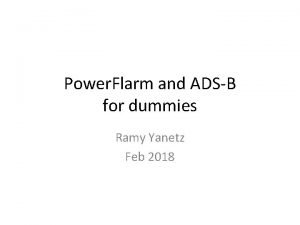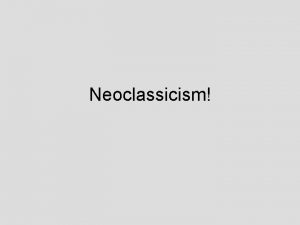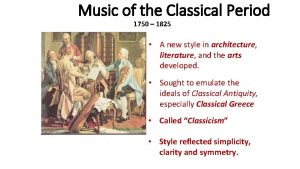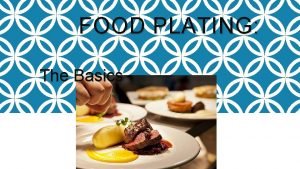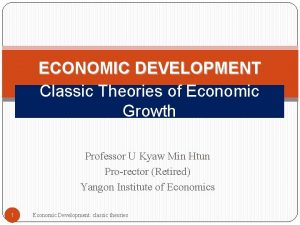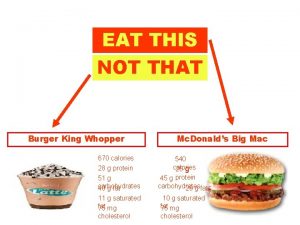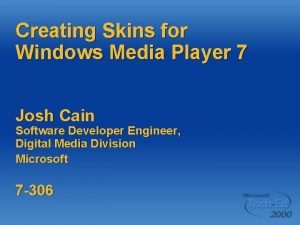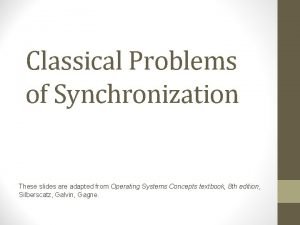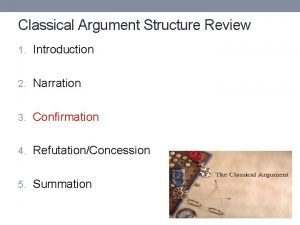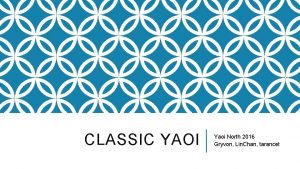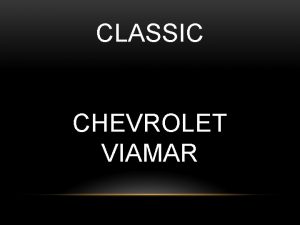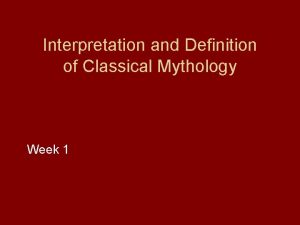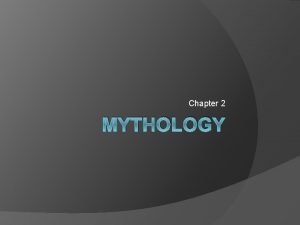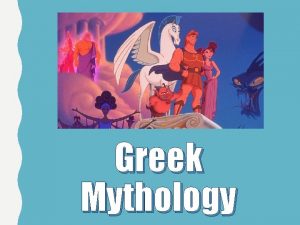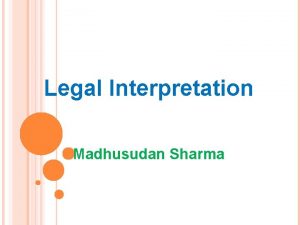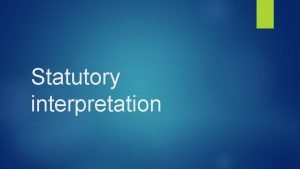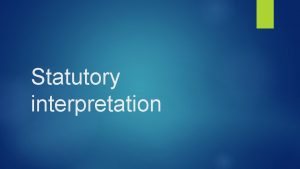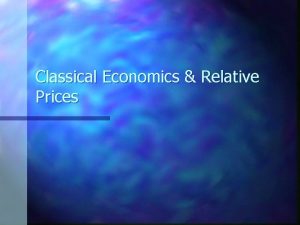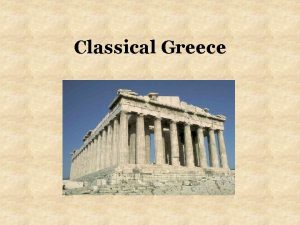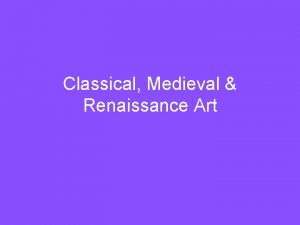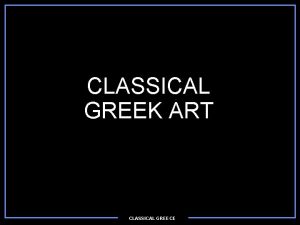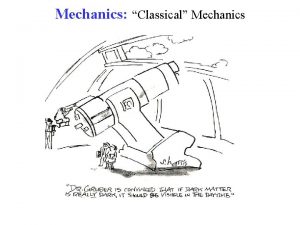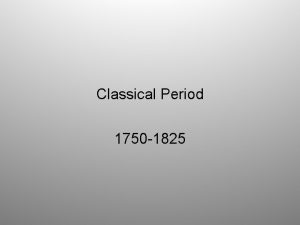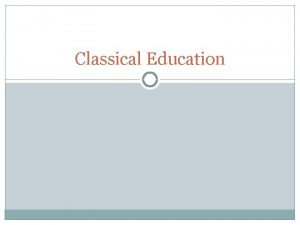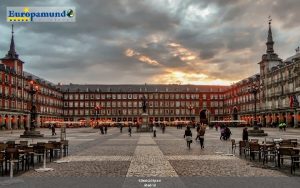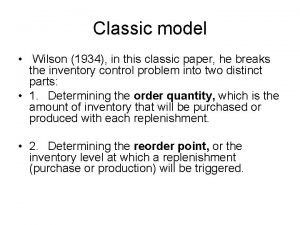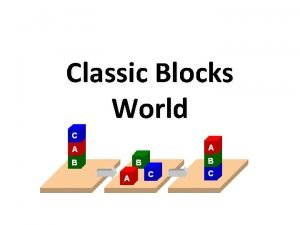Classic Mythology Interpretation and Definition of Classical Mythology




























- Slides: 28

Classic Mythology

Interpretation and Definition of Classical Mythology

The Problem of Defining Mythology • The establishment of a single, comprehensive definition of myth has proved impossible to attain. • No one definition can satisfactorily embrace all the various kinds of stories that can legitimately be classed as myths on the basis of one criterion or another.

The Meaning of “myth” • “Myth” is derived from the Greek word mythos, which can mean tale, or story, and that is essentially what a myth is: a story. • Basic definition: “a traditional story with collective importance. ” • Some will add the qualification that a myth must: • be a “traditional” tale or story. • Has value.

What is a myth? • A legendary story that explains the beliefs of a group of people, or their idea about nature. Myths were created before organized religion

What is Mythology • Every culture has its own myths that help us understand its customs and ways of viewing the world. Mythopedia: Oh My Gods!by Megan E. Bryant

What is Mythology • Most myths have one or more of these characteristics: • Usually about gods or supernatural beings with greater powers and abilities than ordinary humans. • Explain the origins of the world and how humans came to be. • Take place a long time ago, usually in the earliest days of humanity (or just before humans showed up on Earth). • Usually thought to be true by their original tellers--no matter how wild or strange they seem to be. Mythopedia: Oh My Gods! by Megan E. Bryant

Four Essential Elements of Mythology • • The intervening of deities in human affairs. Supernatural character/elements Extraordinary Events Contain heroes and heroines

What is the purpose of myths • Myths can… • Explain how things came to be--like the origin of the universe or the creation of humans. • Teach people about the values and beliefs that are important in their society. • Contain deep religious significance to the people who tell and believe them. • Used to help make sense out of things that were hard to explain (EX: trying to find the reason for a tragedy) Studying myths can teach us about people around the world -- their cultures and what is (or was) important to them. Mythopedia: Oh My Gods! by Megan E. Bryant

How Did We Learn These Stories • Myths were first passed down through storytelling, songs, poetry and art. • We learned the stories from written versions, mainly Homer’s epic poems The Illiad and The Odyssey, which tell of the great deeds of heroes. • Other sources were Hesiod’s Theogony, which describes the origins of the world and the gods, and Homeric Hymns, as collection of poems addressed to different gods. Mythopedia: Oh My Gods! by Megan E. Bryant

Oral tradition • Mythology passed down from one generation to another through oral tradition. • Oral transmission will create constant changes in the myth.

Oral tradition • Sometimes the myths are even different in detail. • Homer's Oedipus rules after he discovers what he has done. • Sophocles's Oedipus puts his eyes out and goes into exile. • One version is not more true than another. • Typically we focus on the best-known variants. • But in reality, a myth is the collection of all its variants.

Types of Myth

Types of Myth • Can be distinguished by the nature of the main characters and the meaning they had for the listeners. • Divine Myth • Supernatural beings are the main actors • Legend (Saga) • Containing a kernel of historical truth. Main actors are human heroes • Folktales • Include elements of fantasy and magic. Main actors are ordinary people or animals. (Fairytale would go under folktale.

Divine Myth • Gods are beings that are vastly superior, more powerful, and more splendid than human beings. • Control forces of nature and whose quarrels can cause cosmic cataclysms. • Sometimes fully developed personalities, sometimes mere personified abstractions: • Zeus as opposed to Nikê (= Gk. victory) •

Divine Myth • Although these divine myths and the gods have religious implications, they do not constitute “religion. ” • A myth is a story. • Religion is a set of actions directed by beliefs. © 2012 Pearson Education Inc.

Divine Myth • Divine myth often provide the grand explanations for why the cosmos is the way it is. • Its overall structure • Its rhythms • Humankind’s place in it and its duties and roles • Sometimes they explained only local traditions or practices.

Divine Myth • Myths with explanatory purpose are called etiological. • Origin of Mt. Etna (Typhoeus) • Why the season vary (Persephonê and Demeter) © 2012 Pearson Education Inc.

Divine Myth • Divine myth and modern theoretical science both tell of the origins of the fundamental arrangement of the cosmos as we experience it. • Divine myth attributes the causes to the acts of willing, sapient beings. • Theoretical science refers to impersonal and general laws.

Legend • A legend is a story often believed to be true in which the characters are usually considered historical by some. • For example: Robin Hood or King Arthur

Legend • As divine myth is analogous to theoretical science, so legend is analogous to history. • “What happened in the human past? ” • Central characters are great human heroes. • The gods play a role, but they are not center stage. • Apollo orders Orestes to kill his mother, but Orestes is the main character.

Legend • These are not the acts of ordinary human beings, but they are still human. • Legends take place on earth in the remote past and were thought to be real human events. • The Greeks’ main interest wasn’t historical accuracy but the human drama of the events.

Folktale • A broad category that can include fables and fairytales. • Main characters are not great men and women, but just plain “folk. ” • Can include animals with the power to speak, which are called fables. • Folktale might represent traditional customs, beliefs, knowledge, values, and attitudes of the ordinary people.

Folktale • The characters are not believed to have really existed. • Often of very low social status, (mis)underestimated and abused by their social betters. • Youngest of the family • Folktale ends with reversal of fortune. • The trickster hero outwits his opponents

Folktale • Primary purpose is to entertain. • May also explain or justify traditional forms of society and beliefs. • Good eventually wins out • Family structures and order • Many popular films, TV programs, and novels are analogous to folktales. © 2012 Pearson Education Inc.

Epic Defined • Epic: A long narrative poem about the deeds of gods and heroes. It must meet the following conventions: • There must be an epic hero. • The setting is vast. It takes place nationally and internationally. It is given cosmic significance. • There is an element of the supernatural. • The hero is on a quest. He/she is searching for a larger truth about life. • Gods and goddesses play an important role in the life of the hero.

Epic Hero Cycle • Epic Hero: The protagonist of the epic. He/she: • • • Is a hero, often possessed of supernatural abilities or qualities Is charged with a quest Is tested to prove his/her worthiness Is helped or harmed by many different mythical creatures Travels take him to a supernatural world, usually an area where humans can’t go

Epic Hero Cycle • Epic Hero: The protagonist of the epic. He/she: • Reaches a low point where he or she almost gives up • Raises above the doubt • Reaches restitution. Often takes the form of the hero regaining his rightful place on the throne.
 Difference between primitive and classical mythology
Difference between primitive and classical mythology How does interpretation b differ from interpretation a
How does interpretation b differ from interpretation a Myth examples
Myth examples Mentor archetype in greek mythology
Mentor archetype in greek mythology Northrop frye archetypes
Northrop frye archetypes Trident gum mythology definition
Trident gum mythology definition Epithet poetry
Epithet poetry Tantalize greek mythology definition
Tantalize greek mythology definition Flop fashion cycle examples
Flop fashion cycle examples Classic ethernet physical layer
Classic ethernet physical layer History of avr
History of avr Classic vs exertional heat stroke
Classic vs exertional heat stroke Space mouse
Space mouse Four classic marketing activities of crm
Four classic marketing activities of crm Protective custom choice
Protective custom choice Power flarm
Power flarm Planmeca compact i classic
Planmeca compact i classic Renault classic club
Renault classic club Characteristics of neoclassism
Characteristics of neoclassism 1750 music
1750 music Classic arrangement of plating styles
Classic arrangement of plating styles Hollis chenery
Hollis chenery Burger king eat this not that
Burger king eat this not that Windows media player skin
Windows media player skin Basic performance equation
Basic performance equation Ctfr
Ctfr Classical problems of synchronization
Classical problems of synchronization Ceel paragraph
Ceel paragraph Yaoi
Yaoi
